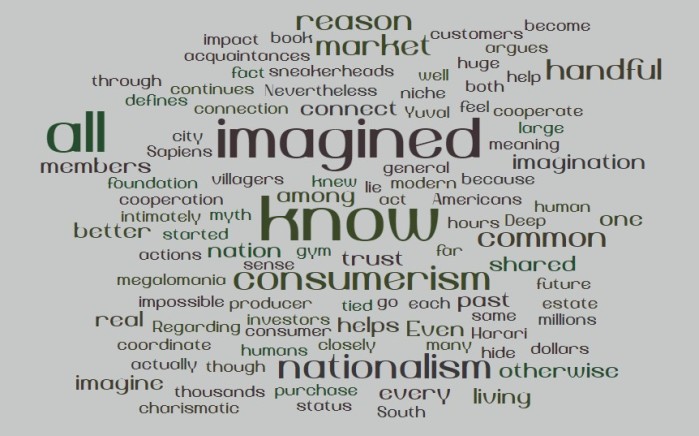In his book Sapiens, Yuval Noah Harari argues that consumerism and nationalism are linked through their shared status as imagined communities. Harari defines an imagined community as “a community of people who don’t really know each other, but imagine that they do.” In a market, we don’t know every producer or every other consumer. The actions of all the other producers and consumers impact us, and we may have niche markets that we are intimately tied to, but we don’t really know many other people in the market. In a nation, we may know a handful of people very closely, another handful of people well, and have a handful of acquaintances, but we certainly don’t know everyone. Nevertheless, we can act as though we know everyone in a community of gym enthusiasts, sneakerheads, or real estate investors. We can feel a unity and connection with all 330 million Americans, all citizens in the Deep South, or everyone living in our city. But these communities are imagined, we don’t really know everyone and don’t actually live in community with them.
Regarding consumerism and nationalism Harari continues, “both are imagined communities because it is impossible for all customers in a market or for all members of a nation to really know one another the way villagers knew one another in the past.” Even if they are not really real, these imagined communities exist for a reason. They help us cooperate and coordinate among huge numbers of humans. “consumerism and nationalism work extra hours to make us imagine that millions of strangers belong to the same community as ourselves, that we all have a common past, common interests, and a common future. This isn’t a lie. It’s imagination.”
This imagination helps us connect with people we otherwise wouldn’t have a reason to connect with. It helps us trust people we otherwise wouldn’t have a reason to trust. It can go too far and lead us to purchase shoes for thousands of dollars or to die in wars started by the megalomania of a charismatic leader. But in general, consumerism and nationalism have become a foundation for large scale human cooperation in the modern era. We hide the fact that these communities are imagined and the better we do the better we can participate with the other members of our imagined community. It can give us a sense of purpose and meaning in interacting and living among other people, even if it is all based on shared myth.


